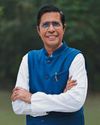
Former RBI governor and economist Raghuram Rajan has been vocal about his ideas on policy matters in India. His latest book Breaking the Mould, co-authored with economist Rohit Lamba, is a deep dive into finer issues of the economy, including welfare schemes, job crisis, misplaced priorities of the government and much more. In an interview, Rajan demystifies the current narrative of growth in the country and why manufacturing-led growth might not be the best solution at hand. Edited excerpts:
There is an oscillation between growth and redistribution cycles in a country’s economic trajectory, according to your book. How do you identify India’s post-2014 journey—as a period of growth or one of redistribution?
If you are talking about the current government, what we have seen over the last nine years is certainly building upon the initial India stack ideas. We have developed a much better ability to offer direct benefits transfers of various kinds, whether it is cooking gas subsidies or transfers to the farmers. In a sense, we have moved into a period where redistribution can be done in perhaps a more efficient way with less leakage along the way.
There is also an incentive sometimes to do this because politicians can get associated with specific schemes of redistribution. In the past, with the leakage that used to happen, you might risk angering people because it was not reaching them. Today, it reaches them instantaneously. That being said, I think the job crisis—and I am going to call it crisis because it is a building problem—means that you cannot stay away from growth for long. You cannot distribute enough to compensate for a good job. If people are not getting jobs, then no amount of distribution can take off some of the edge of your hunger; it cannot hold you up permanently. That is why I think there is certainly a concern about growth.
This story is from the January 2024 edition of Outlook Business.
Start your 7-day Magzter GOLD free trial to access thousands of curated premium stories, and 9,000+ magazines and newspapers.
Already a subscriber ? Sign In
This story is from the January 2024 edition of Outlook Business.
Start your 7-day Magzter GOLD free trial to access thousands of curated premium stories, and 9,000+ magazines and newspapers.
Already a subscriber? Sign In

From Chandni Chowk to Global Recognition
For Manish Aggarwal, director at Bikano, Bikanervala Foods, the family business was not just a responsibility but a passion he took to the global stage

Spotting AI Scams
Al has become an integral part of our lives, from customer service no insurance claims. But it is also becoming a tool for fraudsters who use it to scam individuals and corporations

Let a Hundred Flowers Bloom
On the banks of the Ganges in industrial Kanpur, a start-up has blossomed that turns waste flowers into incense

BATTERY LOW
India produces enough green energy to power many of its largest cities yet lacks the storage to use it efficiently. A nation blazing forward must leap ahead in battery technology to stay on course

We Have Everything Going for Rajasthan
Rajyavardhan Singh Rathore, Rajasthan’s industry and commerce minister, tells Pushpita Dey why the state is suited to become a hub for investments.

Dairy and Other Dilemmas
India’s refusal to open its dairy market has complicated trade negotiations for years. As global partners demand concessions, is the cost of protectionism outweighing benefits?

Riding in a Maze
As gig workers ride into an uncertain future with little more than a smartphone and a bike, the government is struggling to arrange a socialsafety net. But millions without social security is recipe for disaster

BIRLA'S BIGGEST BATTLE
As Kumar Mangalam Birla completes 30 years at the helm of the Aditya Birla Group, he has a battle to defend his businesses and conquer new ones

THE INNOVATION LEAP
India dreams of becoming a product nation. But unless the corporate sector significantly increases spending on R&D, the country will continue to lag behind global peers

EDUCATION BUDGET MUST DOUBLE EVERY 3 YEARS
Veezhinathan Kamakoti, a renowned academic and director of Indian Institute of Technology Madras, tells Deepsekhar Choudhury on what technology sovereignty means for India and how it can propel the country towards its vision of becoming a developed nation by 2047.